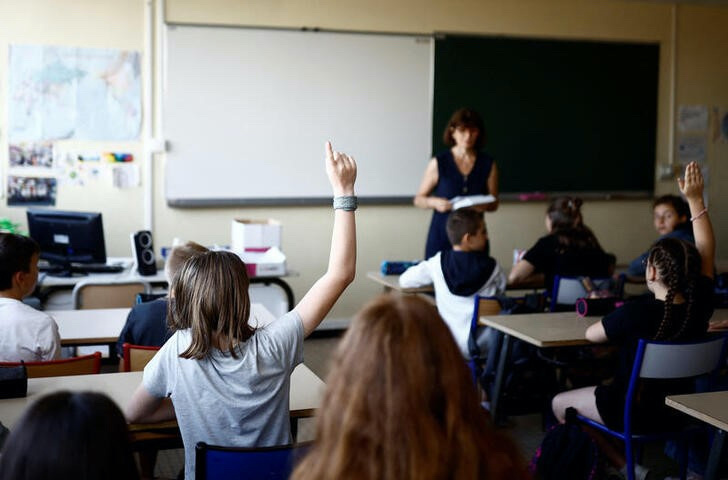Paris, France
Reuters
Teenagers’ mathematics and reading skills are in an unprecedented decline across dozens of countries and COVID school closures are only partly to be blamed, the OECD said on Tuesday in its latest survey of global learning standards.
The Paris-based Organisation for Economic Cooperation and Development said it had seen some of the steepest drops in performance since 2000 when it began its usually triennial tests of 15-year-olds reading, maths and science skills.

Schoolchildren work in a classroom on the first day of the new school year after summer break in Savenay, France, on 4th September, 2023. PICTURE: Reuters/Stephane Mahe/files
Nearly 700,000 youths took the two-hour test last year in the OECD’s 38 mostly developed country members and 44-non members for the latest study, closely watched by policymakers as the largest international comparison of education performance.
Compared to when the tests were last conducted in 2018, reading performance fell by 10 points on average in OECD countries, and by 15 points in mathematics, a loss equivalent to three-quarters of a year’s worth of learning.
While more than half of the 81 countries surveyed saw declines, Germany, Iceland, the Netherlands, Norway and Poland saw particularly sharp drops in mathematics scores, the OECD said.
On average across the OECD, one out of four 15-year-olds tested as a low performer in maths, reading and science, which means they could not use basic algorithms or interpret simple texts, the study found.
“COVID probably played some role but I would not overrate it,” OECD director of education Andreas Schleicher told a news conference.
“There are underlying structural factors and they are much more likely to be permanent features of our education systems that policymakers should really take seriously.”
Countries that provided extra teacher support during COVID school closures scored better and results were generally better in places where easy teacher access for special help was high.
Poorer results tended to be associated with higher rates of mobile phone use for leisure and where schools reported teacher shortages.
The OECD said the decline was not inevitable, pointing to Singapore, where students scored the highest in maths, reading and science, with results that suggested they were on average three to five years ahead of their OECD peers.
After Singapore, Macau, Taiwan, Hong Kong, Japan and South Korea also outperformed in maths and science, where Estonia and Canada also scored well.
In reading, Ireland, Japan, South Korea and Taiwan earned top marks, and was all the more notable in Ireland and Japan because their spending per student was no higher than the OECD average.






